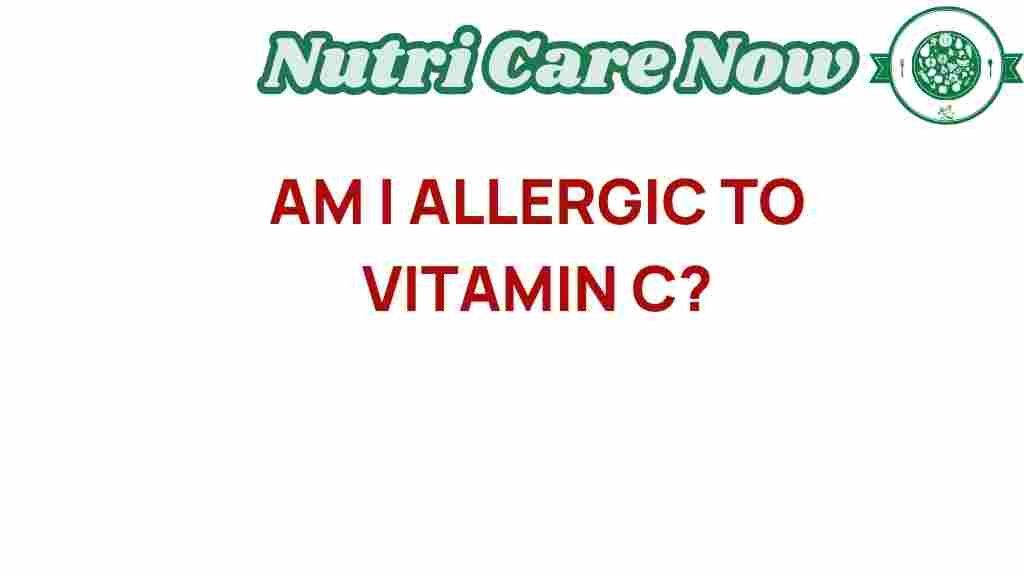Unraveling the Mystery: Could You Be Allergic to Vitamin C?
Vitamin C is a crucial nutrient that plays a vital role in maintaining our immune system, promoting healthy skin, and supporting overall health. However, recent discussions have emerged about the possibility of a Vitamin C allergy. While it is relatively uncommon, some individuals may experience adverse reactions to this essential vitamin. In this article, we will explore the concept of Vitamin C allergy, its symptoms, and what you can do if you suspect you are sensitive to vitamin C.
Understanding Vitamin C and Its Benefits
Vitamin C, also known as ascorbic acid, is a water-soluble vitamin that is important for various bodily functions. Here are some of the key benefits of Vitamin C:
- Supports Immune Function: Vitamin C is known to enhance the immune system, helping the body fend off infections.
- Promotes Healthy Skin: It plays a crucial role in collagen synthesis, which is essential for skin elasticity and repair.
- Antioxidant Properties: Vitamin C acts as an antioxidant, protecting cells from damage caused by free radicals.
- Improves Iron Absorption: It helps in the absorption of iron from plant-based foods, reducing the risk of anemia.
Despite these benefits, some individuals may experience an adverse reaction when consuming vitamin C, leading to the question: could you be allergic to vitamin C?
What is a Vitamin C Allergy?
A Vitamin C allergy refers to an abnormal immune response to vitamin C or products containing this vitamin. While true allergic reactions to vitamin C are rare, some individuals may have a sensitivity to it, leading to various symptoms. This condition can manifest in different ways, particularly with supplements or topical applications.
Symptoms of Vitamin C Allergy
If you suspect you might have a Vitamin C allergy or sensitivity, it’s essential to recognize the symptoms. Common symptoms include:
- Skin Reactions: Rashes, hives, or itching can occur, especially after topical application of products containing vitamin C.
- Gastrointestinal Issues: Symptoms such as nausea, diarrhea, and stomach cramps may arise when taking high doses of vitamin C.
- Respiratory Symptoms: Some individuals may experience sneezing, nasal congestion, or difficulty breathing after exposure.
- Headaches: Frequent headaches may also be reported, particularly after consuming vitamin C supplements.
If you notice any of these symptoms after consuming vitamin C-rich foods or supplements, it may be time to consult a healthcare professional.
Vitamin Sensitivity vs. Vitamin Allergy
It’s important to differentiate between a vitamin sensitivity and a true allergy. A vitamin sensitivity may cause discomfort and adverse reactions, but it does not involve the immune system in the same way an allergy does. Understanding this difference can help you approach the issue appropriately.
Step-by-Step: What to Do If You Suspect Vitamin C Allergy
If you suspect you are allergic to vitamin C, follow these steps:
1. Monitor Your Symptoms
Keep a detailed record of your symptoms and when they occur. Note whether they arise after consuming vitamin C-rich foods, supplements, or topical products. This information will be helpful for your healthcare provider.
2. Eliminate and Test
Consider eliminating vitamin C sources from your diet for a few weeks to see if your symptoms improve. Reintroduce them gradually to observe if your symptoms reappear.
3. Consult a Healthcare Professional
Schedule an appointment with a doctor or an allergist. They may perform tests, such as skin prick tests or blood tests, to determine if you have a true allergy or sensitivity.
4. Review Your Diet and Supplements
Analyze your dietary intake and any vitamin C supplements you are taking. It may be beneficial to switch to lower doses or explore different forms of vitamin C.
5. Consider Alternative Sources
If you confirm a vitamin C allergy, explore other ways to support your immune system and skin health. Some alternatives include:
- Fruits and Vegetables: Look for vitamin C-rich foods that may not trigger your symptoms, such as bell peppers or strawberries.
- Natural Supplements: Consult with a nutritionist for alternative supplements that provide similar benefits without adverse reactions.
Troubleshooting Tips for Vitamin C Sensitivity
If you experience skin reactions or gastrointestinal issues related to vitamin C, consider these tips:
1. Start with Low Doses
If you want to include vitamin C in your diet, start with small amounts and gradually increase, monitoring your body’s response.
2. Choose Food Sources Over Supplements
Whole food sources of vitamin C, such as oranges and broccoli, are often better tolerated than concentrated supplements.
3. Avoid Topical Products with High Concentrations
If you experience skin reactions, avoid topical products with high concentrations of vitamin C. Look for products labeled as hypoallergenic.
4. Stay Hydrated
Hydration can support your body’s detoxification processes and may help relieve some symptoms associated with vitamin C sensitivity.
Conclusion
In conclusion, while a Vitamin C allergy is rare, vitamin sensitivity can pose dietary concerns for some individuals. Recognizing the symptoms and understanding your body’s responses to vitamin C is crucial. If you suspect you are allergic or sensitive to vitamin C, it’s essential to consult with a healthcare professional who can guide you through the process of managing your health and nutrition effectively.
For more information on nutrition and health, visit Healthline for expert advice.
If you want to learn more about how to manage allergies and sensitivities, check out our detailed guide on dietary concerns and solutions.
This article is in the category Health and created by NutriCareNow Team
